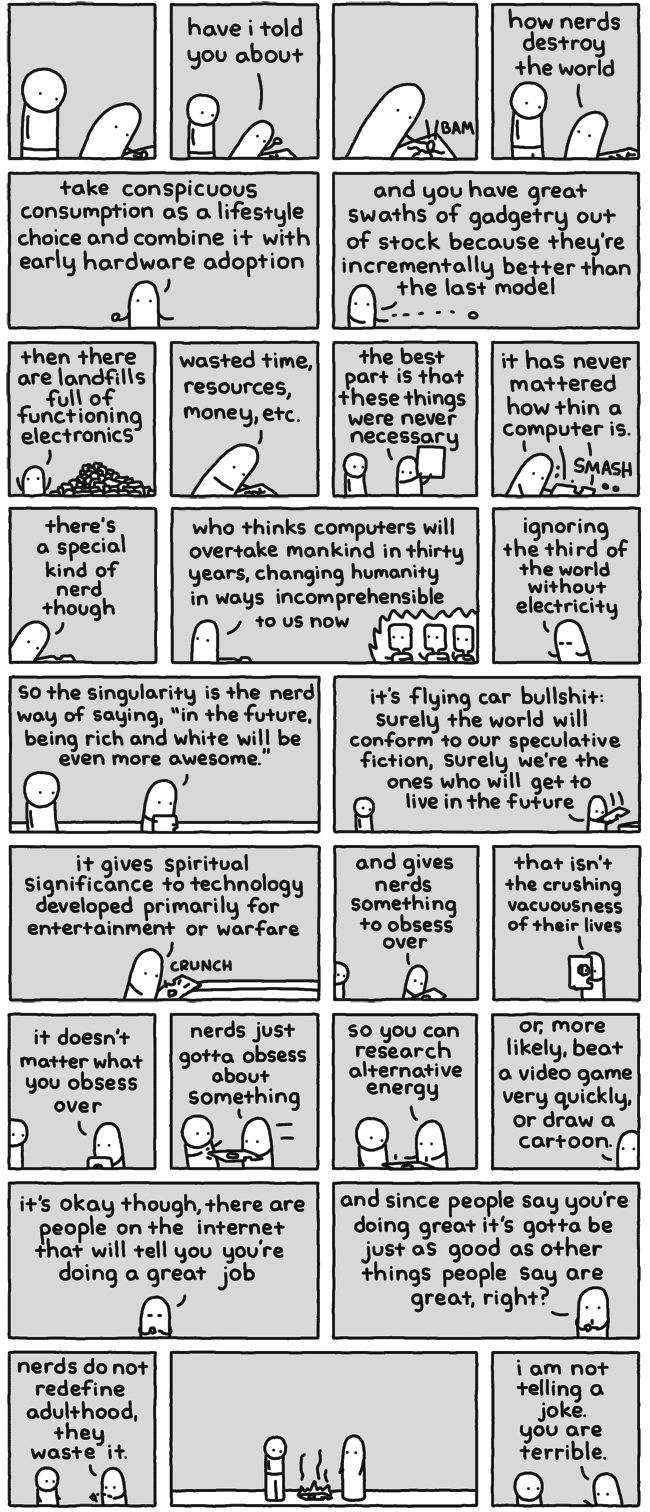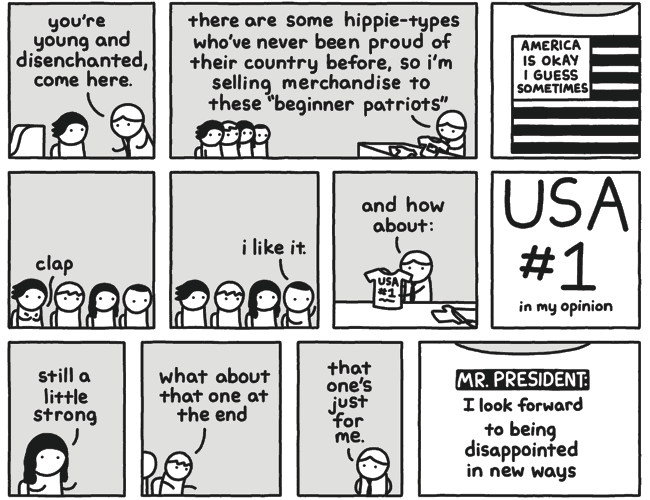I don’t WANT a thin, sleek computer. I want more ports than the Pacific Ocean. I want a laptop I can bludgeon someone to death with. I want it to have such processing power, the fans are loud enough that I get noise complaints.
thinkpad gang 😎
“I’m a PC!”
The woke left destroyed computers! :(
On the new iMac, all four USB-C ports support Thunderbolt 4 for superfast data transfers
It probably has more USB connectivity than 90% of computers. Since they’re all Thunderbolt, you can probably connect a dock or USB hub and add a lot more USB devices.
I love thermal throttling under even mild workloads because my computer is designed only for aesthetics and the only cooling solution is “well the body is aluminum so thats like a heatsink i guess”
In Apple’s defense, Apple Silicon processors are at least better about thermal efficiency.
On the other hand, tech companies should have learned from the Red Ring of Death and stayed away from this form over function thing.
True, the new M chips do run a lot cooler, its at least an improvement over their intel macs which would throttle if you tried to do literally anything. This could be solved by 1mm more of thickness and a laptop fan but apple understands their fanbase and would never do that.
What ever happened to MEMS fans?
Cost vs cooling efficiency isn’t there yet. Maybe it gets better after a few more years of research, maybe it hits a dead end like thermoelectric pads, hard to say without insider knowledge.
I did some more googling, seems like at best it can deliver 6 watts of cooling for each watt… not sure how they’ll bridge that gap without something remarkable in material science and manufacturing, the commercialisation in a different sector
deleted by creator
The m series processors don’t really overheat
They are more efficient for sure, but whether or not they overheat is a matter of how much passive cooling that box really has, e.g. the Macbook Airs still have some issues with throttling, I haven’t looked at the specs but maybe they power limit the chips in the imacs at the cost of some performance in order to not hit TJ max, but if that’s the case why not just buy a higher end mbp?
The full comic is even more prescient.
EDIT: I don’t like the ableist parts though. I specifically meant the prescience of the “singularity” power fantasies that promise more comfort to already comfortable affluent techbros.

deleted by creator
There’s clearly some weird self hatred going on there
I didn’t like the whole thing myself but the “singularity” dunk was well earned.
deleted by creator
Me going to my high school reunion solely to tell the jocks “You were right about everything. You were trying to help me.”
Although it’s something the comic touched up on a bit, I’m surprised there isn’t some businesses that’s all about repurposing e-waste. Just install ubuntu or something and then sell them for cheap.
There’s plenty of marketplaces that sell only refurbished electronics. It’s how I got my laptop.
deleted by creator
Mandatory app updates and built-to-fail batteries and other components just seal the deal
Yep, and the thinness of phones makes all this worse too
deleted by creator
marketing

 sales
sales
The closest thing is recycling the gold from circuitboards.
I can see why the OP only used the first third
The rest starts ok then veers off into nonsense The “singularity” and related nerd rapture escapist power fantasies deserve to be mocked and tend to be comfort prophecies for the already comfortable.
The “singularity” and related nerd rapture escapist power fantasies deserve to be mocked and tend to be comfort prophecies for the already comfortable.That is the “starts ok” part
Agreed.
deleted by creator
I edited my earlier comment to clarify that I don’t like the ableism rant at the bottom either.
deleted by creator
nerds gotta obsess about something
so you can research alternative energy
Alright it’s too early in the morning to be personally attacked like this
deleted by creator
That part was
 to me.
to me.I mostly remembered the “singularity” dunk and its prophecy of additional comfort to already comfortable techbros.
Incredibly prophetic, I can’t believe it’s what, at least a decade old?
I don’t have a particular chip on my shoulder about Apple but who tf are all these people who want “AI” bullshit on their devices
Lots of insufferable tech nerds want a magic mirror to tell them who the epicest is of them all.
Rubes
it’s literally just a bunch of tech dweebs making these decisions who only hang out with other tech dweebs so they have no idea what the average person wants
Most people want longer battery lives and cheaper repairs, they’ve wanted those for years. Instead, we get AI which can reply to texts for us, that we still need to proof read anyway. Which is just a soulless amalgamation of the words of everyone we’ve never met
is just a soulless amalgamation of the words of everyone we’ve never met
god that is one of the best single sentence descriptions of LLM chatbots i’ve ever heard
You’re absolutely right — battery life and repairability are some of the most requested features, and they affect how we use our devices daily. The addition of Apple Intelligence on iMacs does seem geared toward more advanced functionality, but it doesn’t necessarily address the core user demands like longevity and affordability. AI can bring impressive new tools, like advanced text recognition or more intuitive workflows, but if the basics like battery life and repairs aren’t up to par, it’s a harder sell. Users want tech that lasts and doesn’t feel like a constant upgrade cycle
but the market says AI is the future??

Techbros think that the masses want or need the bazinga tech so badly that it’s forcibly pushed on them, from OSes to search engines.
Wait, you don’t want a Bazinga key dedicated to making shit up by burning rainforest?
when you put it like that, i’m almost sold. tell me, does the AI almost always default to being racist as well? if so, i’m in.
I unironically talk to AIs a lot because it’s easier than talking to actual people
have you ever wanted laptop components in a way less convenient form factor?
what if i were to tell you it costs more than rent?
what if i were to also tell you it’s intentionally underpowered so we don’t have to actually innovate with “new” iterations that will cost even more than this one and you’ll eventually be forced to buy one because we arbitrarily decide when your device is too old and will no longer allow you to update anything on it and can’t use it anymore unless you use openCORE, which you as a normal person probably don’t know how to do?
You can call Apple Silicon a lot of things but “not performant” isn’t one of them. In laptops they’ve demolished Windows offerings for years (Lunar Lake is only just now trading blows with M3), and in desktops I don’t think you’re getting any better CPU performance at that price point (especially considering it comes with a 4k monitor).
The caveat is GPU and gaming performance, but people really shouldn’t expect much from integrated graphics.
Consider Ellen Willis:
If white radicals are serious about revolution, they are going to have to discard a lot of bullshit ideology created by and for educated white middle-class males. A good example of what has to go is the popular theory of consumerism. As expounded by many leftist thinkers, notably Marcuse, this theory maintains that consumers are psychically manipulated by the mass media to crave more and more consumer goods, and thus power an economy that depends on constantly expanding sales. […] When a woman spends a lot of money and time decorating her home or herself, or hunting down the latest in vacuum cleaners, it is not idle self-indulgence (let alone the result of psychic manipulation) but a healthy attempt to find outlets for her creative energies within her circumscribed role. [8]
just because I’m halfway through reading this and it stuck out to me
my computer is 10 years old in my defense
there's a shit ton of text inbetween the [...] which i would recommend one reads because the shortened quote leaves out way too much to be of any value
If white radicals are serious about revolution, they are going to have to discard a lot of bullshit ideology created by and for educated white middle-class males. A good example of what has to go is the popular theory of consumerism.
As expounded by many leftist thinkers, notably Marcuse, this theory maintains that consumers are psychically manipulated by the mass media to crave more and more consumer goods, and thus power an economy that depends on constantly expanding sales. The theory is said to be particularly applicable to women, for women do most of the actual buying, their consumption is often directly related to their oppression (e.g. makeup, soap flakes), and they are a special target of advertisers. According to this view, the society defines women as consumers, and the purpose of the prevailing media image of women as passive sexual objects is to sell products. It follows that the beneficiaries of this depreciation of women are not men but the corporate power structure.
First of all, there is nothing inherently wrong with consumption. Shopping and consuming are enjoyable human activities and the marketplace has been a center of social life for thousands of years.
The locus of oppression resides in the production function: people have no control over which commodities are produced (or services performed), in what amounts, under what conditions, or how these commodities are distributed. Corporations make these decisions and base them solely on their profit potential.
As it is, the profusion of commodities is a genuine and powerful compensation for oppression. It is a bribe, but like all bribes it offers concrete benefits — in the average American’s case, a degree of physical comfort unparalleled in history. Under present conditions, people are preoccupied with consumer goods not because they are brainwashed but because buying is the one pleasurable activity not only permitted but actively encouraged by our rulers. The pleasure of eating an ice cream cone may be minor compared to the pleasure of meaningful, autonomous work, but the former is easily available and the latter is not. A poor family would undoubtedly rather have a decent apartment than a new TV, but since they are unlikely to get the apartment, what is to be gained by not getting the TV?
The confusion between cause and effect is particularly apparent in the consumerist analysis of women’s oppression. Women are not manipulated by the media into being domestic servants and mindless sexual decorations, the better to sell soap and hair spray. Rather, the image reflects women as they are forced by men in a sexist society to behave. Male supremacy is the oldest and most basic form of class exploitation; it was not invented by a smart ad man. The real evil of the media image of women is that it supports the sexist status quo. In a sense, the fashion, cosmetics, and “feminine hygiene” ads are aimed more at men than at women. They encourage men to expect women to sport all the latest trappings of sexual slavery — expectations women must then fulfill if they are to survive. That advertisers exploit women’s subordination rather than cause it can be clearly seen now that male fashions and toiletries have become big business. In contrast to ads for women’s products, whose appeal is “use this and he will want you” (or “if you don’t use this, he won’t want you”), ads for the male counterparts urge, “You too can enjoy perfume and bright-colored clothes; don’t worry, it doesn’t make you feminine.” Although advertisers are careful to emphasize how virile these products are (giving them names like “Brut,” showing the man who uses them hunting or flirting with admiring women — who, incidentally, remain decorative objects when the sell is aimed directly at men), it is never claimed that the product is essential to masculinity (as make-up is essential to femininity), only compatible with it. To convince a man to buy, an ad must appeal to his desire for autonomy and freedom from conventional restrictions; to convince a woman, an ad must appeal to her need to please the male oppressor.
For women, buying and wearing clothes and beauty aids is not so much consumption as work. One of a woman’s jobs in this society is to be an attractive sexual object, and clothes and make up are tools of the trade. Similarly, buying food and household furnishings is a domestic task; it is the wife’s chore to pick out the commodities that will be consumed by the whole family. Appliances and cleaning materials are tools that faciliate her domestic function. When a woman spends a lot of money and time decorating her home or herself, or hunting down the latest in vacuum cleaners, it is not idle self-indulgence (let alone the result of psychic manipulation) but a healthy attempt to find outlets for her creative energies within her circumscribed role.
There is a persistent myth that a wife has control over her husband’s money because she gets to spend it. Actually, she does not have much more financial authority than the employee of a corporation who is delegated to buy office furniture or supplies. The husband, especially if he is rich, may allow his wife wide latitude in spending — he may reason that since she has to work in the home she is entitled to furnish it to her taste, or he may simply not want to bother with domestic details — but he retains the ultimate veto power. If he doesn’t like the way his wife handles his money, she will hear about it. In most households, particularly in the working class, a wife cannot make significant expenditures, either personal or in her role as object-servant, without consulting her husband. And more often than not, according to statistics, it is the husband who makes the final decisions about furniture and appliances as well as about other major expenditures like houses, cars and vacations.
Consumerism as applied to women is blatantly sexist. The pervasive image of the empty-headed female consumer constantly trying her husband’s patience with her extravagant purchases contributes to the myth of male superiority: we are incapable of spending money rationally: all we need to make us happy is a new hat now and then. (There is an analogous racial stereotype — the black with his Cadillac and magenta shirts.) Furthermore, the consumerism line allows Movement men to avoid recognizing that they exploit women by attributing women’s oppression solely to capitalism. It fits neatly into already existing radical theory and concerns, saving the Movement the trouble of tackling the real problems of women’s liberation. And it removed the struggle against male supremacy by dividing women. Just as in the male movement, the belief in consumerism encourages radical women to patronize and put down other women for trying to survive as best they can, and maintains individualist illusions.
If we are to build a mass movement we must recognize that no individual decision, like rejecting consumption, can liberate us. We must stop arguing about whose life style is better (and secretly believing ours is) and tend to the task of collectively fighting our own oppression and the ways in which we oppress others. When we create a political alternative to sexism, racism, and capitalism, the consumer problem, if it is a problem, will take care of itself.
I havent been able to focus enough to finished the redsails article, i would never have caught this, thank you
great quote, thanks. I think this is also compatible with Ads Don’t Work That Way which argues that rather than psychically manipulating consumers to crave stuff, ads just build social consensus (you know that other people have seen the ad).
Fits with this quote I thought was from Parenti but actually from Stanley J Baran apparently?
“Mass media doesn’t tell you what to think, but it tells you what to think about.”
deleted by creator
I also like the reference “to find outlets for her creative energies” because it charts a positive future that is compatible with a minimal consumption economy.
That said, I think in the half century since that was written, it’s become considerably less healthy. With the rise of social media, there’s also an increased blurring between social pressure and corporate funded “psychic manipulation”.
deleted by creator
my old boss would always insist on a Mac desktop for his work computer, so his computer spend was like 3 times mine and he would upgrade nearly twice as often.
I did video editing, GIS computational analysis, bespoke data processing/management, graphic design for printed resources, and interactive digital interfaces.
he checked his email and struggled to open PDFs. one time I needed him to sign a PDF when no one was around to do it for him. it took him 45 minutes of focused concentration and when he sent it back, it was somehow upside-down, backwards and on the wrong page.
I took a screenshot of it and showed it to people sometimes.
i prefer clunky durability, redundancy, and raw power
plus i like a large space to work in and swap out parts.
deleted by creator
Holy shit right? Absolutely loved pfsc, still remember building up a bunch of new ones and then starting the story over again to catch up. I still have the book and have lent it to friends, and it’s always been interesting to see what they think of it.
Also this unlocked a memory where one year in college for a party I made an “America Is Okay I Guess Sometimes” t-shirt. Relevant comic:

Actually kinda great to look back and see how I was already on the path to
 by 2012 lmao
by 2012 lmao
deleted by creator
Waste aside these look ugly as shit
as someone who had multiple computer monitors with big CRTs, one of which was fully 2’ deep and took up half of my desk, yes, the thickness of a computer has sometimes mattered a bit
Colors and design are pretty nice, I’ll give em that
It just looks like an iPad on a stand, which looks like a giant iPhone.
I can get the “unified design language” thing, but like try to make something cool.
Now more rare earth metals being wasted and more plastic trash and even more carbon dumping because of bazinga.

actually it very frequently matters how thin and small computers are, just not personal computers



















